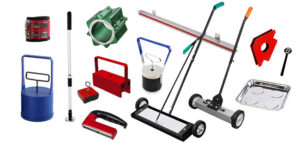Magnetic tools are devices that utilize the power of magnets to perform a wide range of tasks, often making the job easier, safer, and more efficient. These tools incorporate magnets to either hold, lift, retrieve, or manipulate metallic objects, particularly those made of ferrous metals (like iron, steel, or certain alloys that are attracted to magnets).
Advantages of Magnetic Tools
Magnetic tools are being used more widely due to several key advantages they offer in various industries:
1. Increased Strength and Efficiency
Modern magnetic materials, especially rare-earth magnets like neodymium and samarium-cobalt, are incredibly strong. They allow for smaller, lighter tools that perform the same functions as larger, heavier counterparts. This increases efficiency and precision in tasks like lifting, holding, and positioning metal objects.
2. Non-Intrusive Applications
Magnetic tools can hold or manipulate objects without physically touching them. This is ideal for delicate or sensitive operations, such as in electronics manufacturing, where a magnet can pick up small parts without damaging them.
3. Hands-Free Operation
In applications like welding, magnetic clamps can hold metal pieces in place, freeing up workers’ hands for other tasks. This increases productivity and safety by reducing the need for manual holding.
4. Durability and Reliability
Magnetic tools typically have no moving parts, which reduces wear and tear. They are durable, reliable, and require minimal maintenance. This makes them ideal for long-term use in tough environments, such as construction or automotive industries.
5. Precision in Manufacturing
In precision industries like machining and metalworking, magnetic workholding tools can securely hold workpieces during milling or drilling operations. This ensures accurate results and prevents the material from slipping.
6. Safety and Cleanliness
Magnetic sweepers are used in construction to pick up nails, screws, and other metal debris, helping keep work areas clean and reducing the risk of injuries from sharp objects. Similarly, magnetic lifters can move large metal items without the need for slings or hooks, reducing accident risks.
7. Cost-Effectiveness
Due to their low maintenance requirements and versatility, magnetic tools can often replace more complex mechanical or hydraulic systems, leading to cost savings over time.
These advantages make magnetic tools indispensable across a range of sectors including construction, manufacturing, automotive, and electronics industries.
Types of Magnetic Tools
Magnetic tools come in a wide variety of types, each designed for specific applications. Here are some of the main types of magnetic tools:
1. Magnetic Sweepers
Used to pick up metal debris like nails, screws, and scrap materials.
Commonly used in construction, workshops, and garages to keep work areas clean and safe.
 2. Magnetic Lifts
2. Magnetic Lifts
Designed to lift and move large, heavy metal objects without using slings, hooks, or chains.
Often used in warehouses, shipyards, and metal fabrication shops.
 3. Magnetic Clamps and Holders
3. Magnetic Clamps and Holders
Used to hold metal workpieces in place during welding, drilling, or machining operations.
Available in various shapes and sizes, including angle clamps for specific positioning needs.
 4. Magnetic Pickup Tools
4. Magnetic Pickup Tools
Small, handheld tools with magnets to pick up metal objects from hard-to-reach places.
Useful for retrieving dropped screws, bolts, and small parts in mechanical or automotive repair.
 5. Magnetic Workholding Devices
5. Magnetic Workholding Devices
Used in machining and milling operations to secure a workpiece firmly to the surface of a machine without traditional mechanical clamps.
Includes magnetic chucks and vises.
Includes magnetic chucks and vises.
 6. Magnetic Tool Holders and Organizers
6. Magnetic Tool Holders and Organizers
Magnetic strips or trays that help organize and store metal tools or parts.
Keeps tools within easy reach and prevents them from getting lost or scattered.
7. Magnetic Retrievers
Similar to pickup tools but designed for retrieving metal objects from deep or difficult-to-access areas, such as under machines or in plumbing.
 8. Magnetic Knife Racks
8. Magnetic Knife Racks
Designed for kitchen use, these racks use magnets to securely hold knives and other metal utensils in place.
Saves space and improves kitchen organization.
 9. Magnetic Water Descalers
9. Magnetic Water Descalers
Devices that use magnetic fields to prevent scale buildup in pipes and water systems.
Often used in plumbing and industrial applications to extend the life of pipes and equipment.
 10. Magnetic Screwdrivers and Bits
10. Magnetic Screwdrivers and Bits
Screwdrivers with magnetic tips or bits that help hold screws in place, making them easier to drive into materials.
Often used in electronics repair, construction, and automotive industries.
These are some of the most common magnetic tools, but many others exist for specialized uses, especially in industrial settings.
The variety of magnetic tools continues to grow as manufacturers develop new ways to harness magnetism for practical purposes.





 2. Magnetic Lifts
2. Magnetic Lifts 3. Magnetic Clamps and Holders
3. Magnetic Clamps and Holders 4. Magnetic Pickup Tools
4. Magnetic Pickup Tools 5. Magnetic Workholding Devices
5. Magnetic Workholding Devices 6. Magnetic Tool Holders and Organizers
6. Magnetic Tool Holders and Organizers 8. Magnetic Knife Racks
8. Magnetic Knife Racks 9. Magnetic Water Descalers
9. Magnetic Water Descalers 10. Magnetic Screwdrivers and Bits
10. Magnetic Screwdrivers and Bits